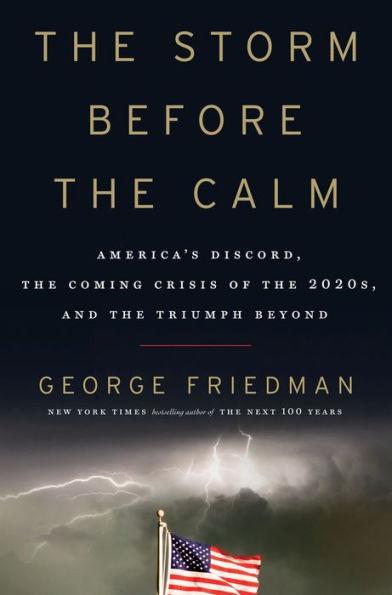
POLITICS/DEMOCRACY
George Friedman
The Storm Before the Calm: America’s Discord, the Coming Crisis of the 2020s, and the Triumph Beyond
Doubleday
Hardcover (also available as an e-book and an audio book), 978-0-3855-4049-0, 256 pgs., $28.95
February 25, 2020
Who will win the acrimonious 2020 presidential election? Shockingly, it won’t actually matter that much, argues renowned geopolitical forecaster George Friedman. America, he contends, is governed less by leaders and legislation and more by cyclical forces that work deep within the nation’s unique structure.
In his intriguing new book, The Storm Before the Calm, the Austin-based New York Times best-selling author describes how “[t]he United States periodically reaches a point of crisis in which it appears to be at war with itself, yet after an extended period it reinvents itself, in a form both faithful to its founding and radically different from what it had been.”
Friedman, whose previous works include The Next 100 Years and The Next Decade, explains: “We tend to evaluate America based on day-to-day news stories and immediate trends and feelings, but the larger wheels of America are driven by two very orderly cycles—the institutional and the socioeconomic.”
As he describes them: “The institutional cycle controls the relationship between the federal government and the rest of American society, and it runs its course every eighty years. The socioeconomic cycle shifts about every fifty years and alters the dynamic of the American economy and society.”
Friedman shows how each cycle has been repeating within its approximate time frame since the days of George Washington and how storms of change have occurred during each shift from one cycle to the next. “The characteristics of a current cycle stop being effective, and the model begins to break down,” he writes. “A period of political tension emerges, ultimately forcing a change in the way things are done. New models emerge and solve the problems, and the country beings a new cycle which operates until that cycle runs into trouble.”
Friedman’s well-written book lays out convincing cases for how the institutional and socioeconomic cycles have played out repeatedly since America’s founding and how the two patterns will, for the first time, almost converge during this decade.
The first institutional cycle, he notes, began with the drafting of the Constitution and ended just after the Civil War. The second cycle ended at the conclusion of World War II. “The strains of the next transition are becoming obvious now,” he notes, “and will take place around 2025.” Meanwhile, the socioeconomic cycle went through its most recent periodic shift in about 1980. And, Friedman cautions, “we are now facing another period of social and economic instability that will conclude in the late 2020s.”
He makes clear, in well-structured detail, that no matter how we view the Trump administration or its 2020 challengers, the current institutional and socioeconomic cycles will remain much more in charge of our fate. We all “are simply passengers on the American roller coaster.”
Multiple troubles still lie ahead, until the “the next phase of American history begins in the early 2030s,” Friedman cautions. But he projects the storms once again will pass, and the nation “actually [will refuel] itself from the crises, re-forming itself with a remarkable agility” previously demonstrated in past cycles.
The ship of state then will sail on, steering itself toward its next reinvention.
George Friedman is founder and chairman of Geopolitical Futures, which specializes in geopolitical forecasting. Prior to this, Friedman was chairman of the global intelligence company Stratfor, which he founded in 1996. Friedman is the author of six books, including the New York Times bestsellers The Next Decade and The Next 100 Years. He lives in Austin, Texas.
